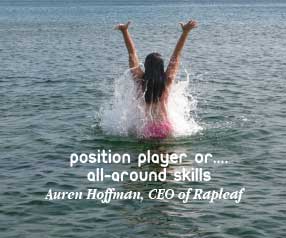
Today’s article comes from Auren Hoffman, the CEO of Rapleaf and an angel investor in more than 30 technology companies. You can catch more of Auren’s insight at Summation
Position Players verses All-Around Athletes
Hiring managers face a dilemma similar to coaches: Should you hire someone who’s really good at one particular thing – or someone who is more of an all-around player? The question is: should a company optimize on experience (people you are confident that will get a specific task done) or on potential (people who are great all-around athletes but not as good at a task you need to get done now)?
Above all else, you should always hire A-Players exclusively. Never hire people that are “good-enough.” You want GREAT people in your organization — people that you love work with and people you’d walk through walls for.
The Position Player
The position player is someone who is amazing at one core thing that your company needs. A professional football team has a ton of position players. These are some of the best people in the world at their position (and they are highly compensated because of it).
When building a great football team, you need a great quarterback, linebacker, wide receiver, kicker, coach, groundsperson, doctor, and more. You need people that are incredibly good at one key role and do it great consistently.
The All-Around Athlete
The all-around athlete is someone that is good at many positions but may not the very best at any particular position (like a winner of the Olympic decathlon). A great athlete on the field is someone that has burst speed, endurance, hand-eye coordination, court-sense, and is a team-player. In a company, a great all-around athlete is likely someone who is crazy smart, works really hard, has a great attitude, communicates well, and is a team-player.
So should your organization recruit the Position Player or the All-Around Athlete?
Answer: it depends on where your company is now.
Scaling mode
If your company is in scaling mode and you know what you are going to be doing for the next three years, you should optimize for position players. While great position players are usually very expensive, they know how to do get their thing done extremely well.
If you are putting together the world’s best football team, you know you are going to need a great kicker. It is going to be extremely hard to win without someone who can kick long field goals consistently, so it is extremely important that you find this person. A kicker is highly specialized (they are probably not going to play any other position) and would be extremely difficult to retrain.
So you only want to invest in getting a kicker if you are sure you will need one for the years to come.
Suppose your company is an ad network looking to build a portfolio of publishers. Someone who’s extremely familiar with the internet advertising space (perhaps someone who has helped build publisher networks in their last two jobs) would be the ideal choice. They won’t come cheap, but they may have the experience to attract world-class publishers.
Change mode (pivoting)
When you are in start-up mode (which might be for many years depending on the company), your business model is likely to change frequently as you pivot based on customer research and an evolving market. When you are in change mode, it’s best to optimize for hiring all-around athletes.
There’s no sense spending time and effort recruiting the best field-goal kicker if next year you decide you want to play basketball instead of football. Avoiding early mistakes – and how to step on the gas One of the common mistakes start-ups make is to immediately bring position players on board.
It’s a risky proposition.
While hiring position players will significantly increase the chance of success for your current model, it gives you little room to pivot. Any significant change in your business model might force you to swap out your team. If you are tech company in change mode (or even if you are developing a "start-up" within a large company), start by finding talented software engineers. (Regardless of the company’s shifts, it’s a safe bet you’ll need people that can write great code.)
Don’t get too specialized, though.
If you hire a killer iPhone developer, that may backfire if you end up building back-end billing systems for large businesses. For non-engineers, change-mode companies should optimize for people who are really smart, get stuff done, and can easily communicate complicated concepts. These people are likely going to be valuable in any setting.
When you finally enter scaling mode, you’ll be well-positioned to accelerate by hiring key position players. You’ll also likely have found that many of your all-around athletes have morphed into position players themselves. With a few additional hires, you can augment their strengths.
Summation
If your company is on a straight road and you want to accelerate growth and propel the company forward, add position players. If the road ahead is cloudy, optimize for all-around athletes.











